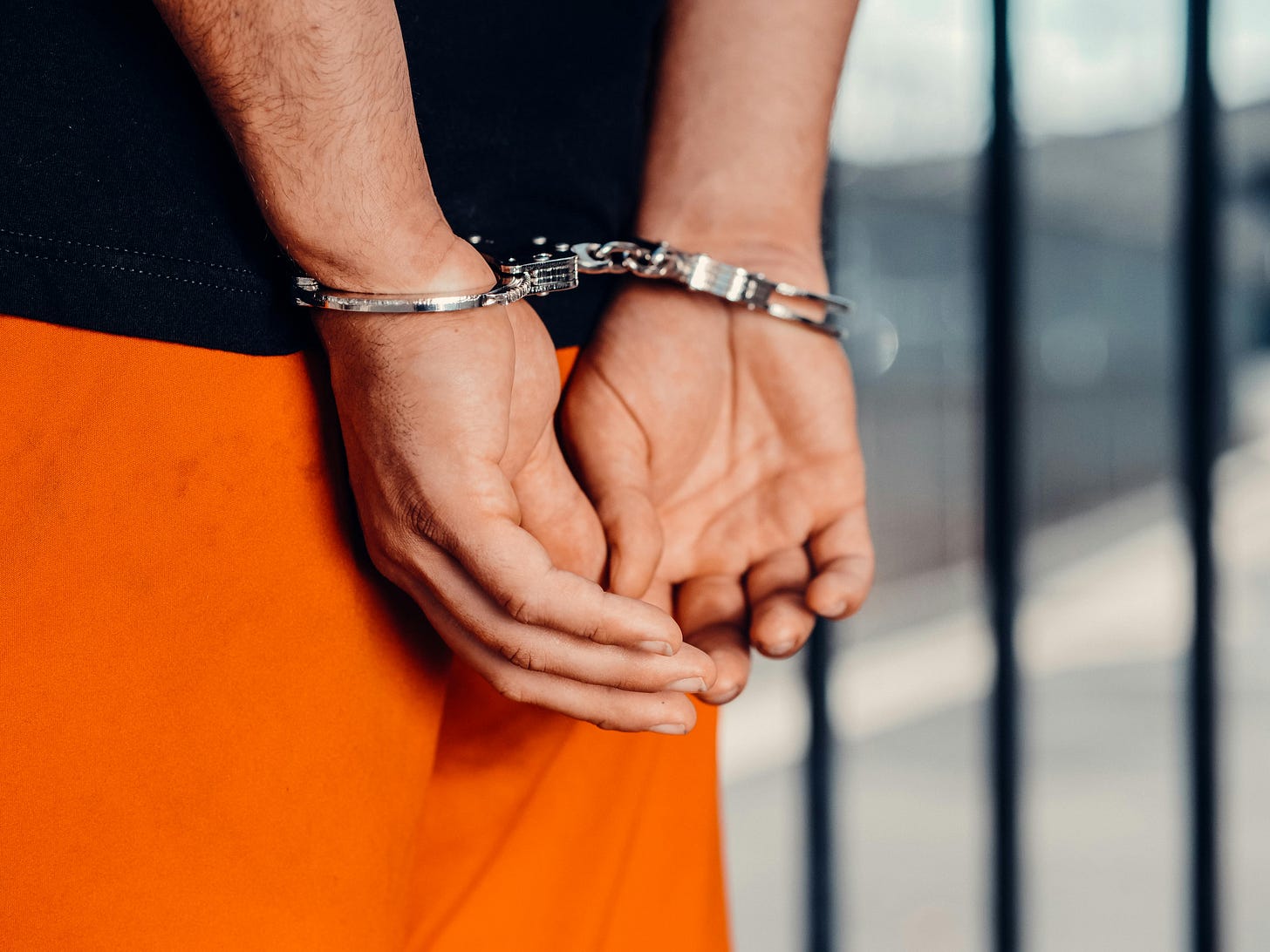Republican Bail Reform Is A Lie
These laws target the poor, the undocumented, and the powerless.
Yesterday was “bail reform” day in the Texas House, where House members took up the Senate’s “bail reform” bills. And while progressive House members and most of the Legislative Black Caucus voted against these bills, there wasn’t a major stand from Democrats against them.
They passed SB9, SB40, SJR1, and SJR5, which are known as “bail reform” bills. Let’s discuss them.
All of these bills were authored by Senator Joan Huffman (R-SD17), who was the same person who authored the racist redistricting maps in 2021. In fact, Huffman has a long history of writing legislation to target and harm both communities of color and immigrants.
After these bills passed in the Senate, Huffman gave the bills to Representative John Smithee (R-HD86) in the House to carry them in that chamber.
It’s worth noting that both Huffman and Smithee are about 70 years old.
Roughly, only 10% of Texas’ 30 million population are white senior citizens. Still, because Texas has the lowest voter turnout in the nation, these are the people running our government. We really need to change that.
SB 40: A manufactured crisis with a manufactured solution.
SB 40 bans cities and counties from using public funds to help nonprofits post bail for people in jail. The bill is built on a lie.
During the floor debate, Smithee admitted there was no clear evidence that Harris County ever used public funds this way but insisted it “shouldn’t happen in the future,” regardless. In other words, there is no problem but plenty of punishment. The bill preemptively blocks local governments from supporting community bail funds, many of which exist to help low-income residents get out of jail while they await trial for minor, nonviolent offenses.
This bill doesn’t stop nonprofits from posting bail. It just prohibits cities and counties from giving them money, even indirectly. That includes grants for unrelated work like education or public health if the nonprofit also runs a bail fund. It’s a backdoor attack on community organizations doing grassroots criminal justice work.
It’s about stripping local control and criminalizing compassion.
Despite its flimsy justification, SB 40 passed overwhelmingly in the House, 132-13.
SB9: A bloated, fear-driven crackdown.
SB9 is a massive 40+ page bill touted as a “bail reform” package and a punitive overreach written to appease tough-on-crime narratives and fear-based politics. It dramatically expands pretrial detention, giving prosecutors new powers to appeal bail decisions, blocks personal bonds for an exhaustive list of offenses (even for first-time defendants), and prohibits local magistrates in large counties from releasing people accused of certain crimes, reserving that power only for district judges.
It adds new reporting burdens, surveillance systems, and restrictions on charitable bail funds, while doing virtually nothing to address the root causes of violence or mass incarceration. The bill relied heavily on emotional testimony and anecdotal horror stories to justify its sweeping changes, despite no solid evidence that ending personal bonds improves public safety.
In practice, SB 9 ensures more poor people, especially Black and brown Texans, will stay locked up before trial simply because they can’t afford to buy their freedom. This is regression.
That’s why it’s no surprise that most of the Legislative Black Caucus and hardline progressives voted against it.
These bills make it harder to get out of jail before trial, limit the use of personal bonds, expand prosecutorial power, and target nonprofit bail funds. Together, these changes feed an already bloated jail system and deepen racial disparities in incarceration.
Members of the Black Caucus know what happens when people get stuck behind bars because they can’t afford bail. Families get separated, jobs are lost, housing is jeopardized, and plea deals get coerced. The so-called “public safety” narrative is a repackaged tough-on-crime agenda designed to criminalize poverty and erode local reform efforts.
Progressives also know these bills are part of a broader pattern. They criminalize defendants and the people trying to help them. They punish community organizations, strip local control from cities like Houston and Austin, and hand even more power to judges and prosecutors who already operate with near-total impunity.
These bills are about control.
And that’s why progressives and the Legislative Black Caucus took a stand, even if they didn’t have the numbers to stop it.
SJR1: A racist, unconstitutional stunt, and a direct threat to DACA recipients
SJR 1, misleadingly named “Jocelyn’s Law,” is a proposed constitutional amendment to automatically deny bail to undocumented immigrants accused (not convicted) of a long list of felonies. It’s a fear-based policy. Not only does this resolution rely on vague, hard-to-verify definitions of “illegal alien,” it strips judges of discretion and denies due process to an entire class of people based on immigration status alone, which violates the US Constitution. (There will be lawsuits, no doubt.)
And most disturbingly, despite multiple impassioned pleas from lawmakers across the aisle, Republicans refused to exempt DACA recipients. This bill plays on xenophobia and feeds the myth that immigrants, especially brown immigrants, are inherently dangerous.
Smithee’s contempt for Dreamers.
During the debate over SJR1, Representative Romero (D-HD90) offered a simple, narrow amendment to exempt DACA recipients. It didn’t remove accountability. It merely asked that these Texans, who’ve passed extensive background checks and stayed out of trouble their entire lives, not be automatically presumed flight risks under a law built on suspicion and fear.
Smithee refused.
Not only did he reject the amendment, he did so by downplaying DACA recipients as “not really” lawfully present, calling the program a mere “grace” and brushing off their lived reality with bureaucratic technicalities. At one point, he even said, “Just because you’re a DACA recipient doesn’t mean you won’t commit a serious crime,” as if that vague hypothetical somehow justified categorically stripping thousands of people of their constitutional rights.
Democrats pushed back hard. Several Democrats laid out what should’ve been obvious, that DACA recipients are not a public safety threat. They are among the most vetted immigrants in the country. They renew their status every two years. They pass background checks. They work, pay taxes, and live under constant political uncertainty. The real risk here is from elected officials turning them into political scapegoats.
But Smithee didn’t budge. He moved to table the amendment. It passed, 86 to 57.
Texas Republicans voted to deny bail and due process protections to DACA recipients, even when those same protections were granted to US citizens under a different bill passed just minutes earlier. Just fear, cruelty, and control.
Dreamers deserved better. Texas deserved better.
SJR5: Expanding pretrial incarceration.
SJR5 is a proposed constitutional amendment that gives judges the authority to deny bail to people accused of certain serious felony offenses if the prosecutor can prove by “clear and convincing evidence” that the person is either a flight risk or a danger to the public.
Sounds reasonable in theory. But in practice, it’s a massive expansion of state power that risks further bloating our jail system while chipping away at the presumption of innocence.
This bill rewrites a core part of the Texas Constitution. For the first time, it would enshrine pretrial detention as a default outcome for people accused (not convicted) of a wide range of crimes, many of which already carry long sentences and high bail amounts. The state’s bar for keeping someone locked up? A vague “clear and convincing evidence” standard that gives prosecutors broad discretion and judges wide latitude, with few real accountability mechanisms.
This process won’t apply evenly. It will be used disproportionately against Black and brown Texans, just like every other pretrial detention policy in this state. When wealthier, white defendants get better lawyers, sympathetic judges, and favorable conditions, they walk. When poor defendants of color show up in court with a public defender and a zip code that screams “disposable,” they get locked up “just in case.”
The real impact will be more overcrowded county jails, more coerced plea deals, and more people losing jobs, housing, and custody of their kids because they were accused, not convicted, of a crime.
Fear-based policies don’t make us safer. They make the state more powerful and more punitive.
Voters will now decide whether to amend the Texas Constitution to lock people up without trial, based on a prosecutor’s claims and a judge’s paperwork.
This is what happens when we don’t vote.
These bills didn’t pass because they had overwhelming public support. They passed because Texas is still one of the lowest-turnout states in the country, especially in local and down-ballot races. And as long as that’s the case, our laws will keep being written by the same small group of people who came into power before most of us were born.
People like Joan Huffman and John Smithee, whose careers began before the internet, before mass incarceration peaked, before the DREAM Act was even an idea, let alone a broken promise. They don’t see Texas for what it is. They’re trying to drag us back to the world they remember, even if that means trampling everyone who doesn’t fit in it.
That only changes if we make it change.
If you’ve been waiting for a sign to get involved, this is it. Join your local Democratic Party. Volunteer with a grassroots group in your area. Donate to a bail fund. Help register new voters. Or, hell, run for office yourself.
We don’t beat this with tweets. We beat it by showing up, getting organized, and refusing to let fear and cruelty rule this state.
They’ve had their turn. Now it’s ours. Let’s get to work.
June 2: The 89th Legislative Session ends.
June 3: The beginning of the 2026 election season.
Click here to find out what Legislative districts you’re in.
LoneStarLeft is a reader-supported publication. To receive new posts and support my work, consider becoming a free or paid subscriber.
Follow me on Facebook, TikTok, Threads, YouTube, and Instagram.




Vote to turn Texas Blue once more!